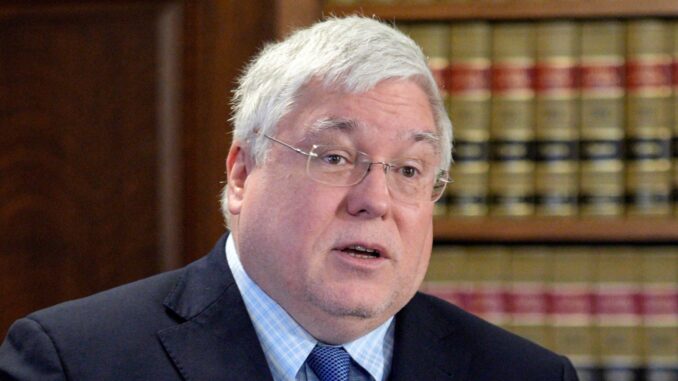
CHARLESTON, W.Va. — West Virginia Gov. Jim Justice signed a number of socially conservative laws during his two terms in office. But he rarely pushed for them.
The Democrat-turned-Republican, now heading to the U.S. Senate to take over the seat of former Independent U.S. Sen. Joe Manchin, instead promoted tax cuts and economic development, approving policies such as the state’s 2022 abortion ban with little public fanfare.
West Virginia has been a conservative stronghold for over a decade, but it could see a shift even further to the right on social policies as one GOP governor replaces another.
Patrick Morrisey, who will be sworn in as Justice’s successor Monday, stands in stark contrast. As state attorney general since 2013 when he became the first Republican to serve in the role in 80 years, Morrisey has emphasized his dogged defense of not only abortion restrictions but also laws creating a school voucher-esque savings account program and prohibiting transgender athletes from participating in sports.
Morrisey will likely take a more hands-on approach with the state Legislature than Justice, who was sometimes accused of being an absentee governor because of his lack of presence at the state Capitol.
During a press conference earlier this month, Morrisey said he planned to “eliminate all vestiges of DEI (diversity, equity, and inclusion) out of state government immediately” and continue a push to “stomp out woke.”
“The politically correct agenda that we saw from the left over the years has no place in West Virginia,” he said.
During his administration, Justice occasionally expressed frustration with the GOP-controlled Legislature for being too extreme, including when he vetoed a bill to curb vaccination requirements for nontraditional public school students last year. In contrast, Morrisey said in a gubernatorial debate last year he would support adding a religious exemption to vaccine requirements in West Virginia. The state currently doesn’t allow nonmedical exemptions.
State Democratic Party Chair Mike Pushkin said he believes Morrisey’s political philosophy differs greatly from Justice’s.
“I think he’s more of an ideologue — he is a true believer,” Pushkin said. “And so you’re more likely to see a very aggressive conservative agenda.”
Morrisey takes the helm as West Virginia Republicans have secured one of the largest legislative supermajorities in the country, controlling 123 out of 134 seats as well as every one of the state’s board of public works and congressional seats. Justice flipped a seat in the U.S. Senate after Manchin decided not to seek reelection, easily defeating a Manchin-endorsed Democrat.
State GOP Party Chair Matt Herridge described West Virginia as the “most dominant Republican state in the nation” and a blueprint for the national party.
“What the people of West Virginia have given the Republican Party is a mandate, in my opinion, to continue to move forward conservative values: less government, more individual autonomy, less governmental autonomy,” he said.
He described Morrisey as a unifying force for a “new Republican Party,” with a more populist, working-class slant where there is room for differences of opinion, while adding that Justice also fits that mold.
Democrats long ruled the state with a strong union presence and identity as the party of working people, holding supermajorities in both chambers as recently as 2008. But in the 2014 general election, voters in the coal-dependent state steered their disgust toward Democratic President Barack Obama’s efforts to cut carbon emissions from coal-fired power plants.
Obama was so unpopular in West Virginia that a federal inmate in Texas received 41% of the vote in the state’s 2012 Democratic presidential primary.
Republicans took control of both legislative chambers after the 2014 election. West Virginia and Oklahoma were the only states where voters in every county voted to elect Donald Trump as president in 2016, 2020 and 2024. Trump won West Virginia with 70% of the vote in 2024, which was the highest percentage in the nation.
During a legislative farewell address last week, Justice touted achievements in cutting the state’s personal income and other taxes, increasing tourism revenue and infrastructure programs. He spoke about the abortion issue in passing toward the end of his remarks.
“We stood rock solid for life, didn’t we?” he said. “And anybody on the outside that would wonder about West Virginia, you best better know — rock solid, we stand for life in West Virginia.”
Justice, a girls basketball coach, said he “proudly” signed the 2021 law prohibiting transgender athletes from competing in the state, but hasn’t advocated as loudly as Morrisey, who repeatedly defended it in court as attorney general.
“We’re not going to allow the elites in the swamp to impose their values on West Virginia citizens,” Morrisey said last year in announcing he would take the case to the U.S. Supreme Court.
Morrisey also announced his intention this past summer to ask the U.S. Supreme Court to review rulings that found the state’s refusal to cover certain health care for transgender people with government-sponsored insurance discriminatory.


Be the first to comment